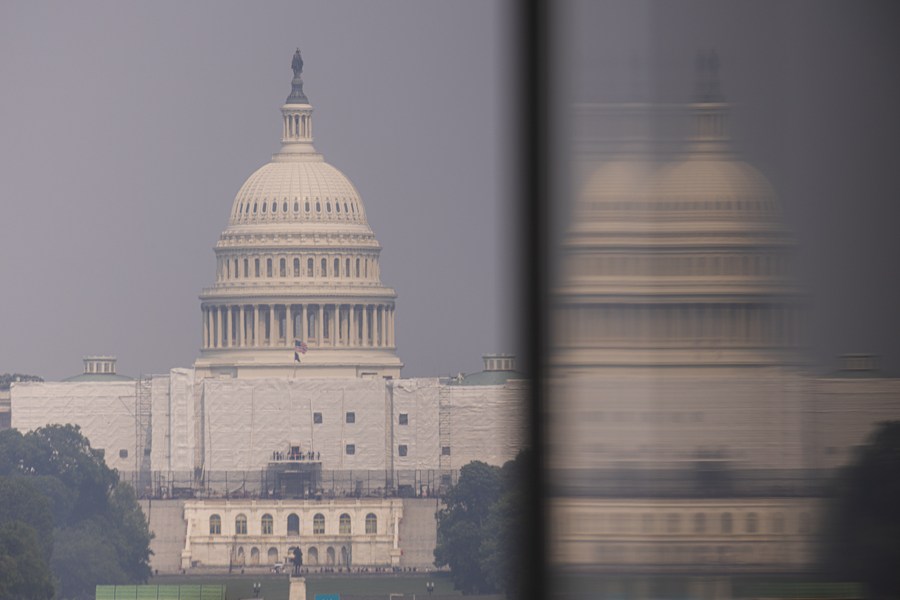Decoupling, de-risking only harm US interests


The constant propagation of the national security doctrine and erosion of the true spirit of international trade and business practices by politicians and policymakers in the United States are leading to destructive trends that harm the national economy, industry and investment propositions in the country.
Unfortunately, the politicians and policymakers have not learnt any lesson from the slowing economy and low industrial output in the US and still insist on pushing unwise legal and administrative de-risking measures against China and Chinese companies.
Economic protectionism, leveraging national security in economic affairs and unilateral imposition of sanctions, investment bans and other forms of decoupling and de-risking steps have become self-destructive, leaving prospects of economic recovery, large scale manufacturing, fiscal and monetary stability and business productivity low.
Recently, the US Department of Commerce ruined the true spirit of international business when it blacklisted 37 Chinese entities, citing so-called Chinese involvement in Russian military affairs. Worse, higher tariffs are being introduced on import of electric vehicles and other products from China.
The spokesperson for the Chinese Ministry of Commerce described it as abuse of export control measures to suppress and contain companies of other countries.
Just as the spokesperson said, such measures have multiplier effects such as promotion of lawless international trading and business systems, blatant denial of the legitimate rights and interests of Chinese companies, undermining the security and stability of global industrial and supply chains, and impeding the recovery and development of the world economy.
In reality the US and Chinese economies are closely interconnected, but their trade and economic ties are becoming strained. Despite record levels of US-China bilateral trade in 2022, the trading relationship is becoming less interdependent. Rising tensions between Washington and Beijing are driving US and Chinese investors away from each market.
The US government will feel the impact of its decoupling policy against China and face difficulties in producing EV batteries without Chinese-produced graphite. Graphite is a core material in lithium batteries, and currently China accounts for 70 percent of its supply worldwide.
The truth is, economic protectionism will not save the US economy, industry or society.
The US decoupling and containment policies against China are badly hurting the efficiency, productivity and growth of its industries. Critical analysis reveals that the US government has implemented stringent export controls to weaken China's high-tech capability in the last three years. Nevertheless, the US decoupling and containment policies are backfiring, negatively impacting the US itself, creating a complex double-edged effect.
The Federal Reserve Bank of New York's latest report, titled "Geopolitical Risk and Decoupling: Evidence from US Export Controls", highlighted this issue. It reconfirmed that the US export controls led to widespread decoupling between American suppliers and Chinese companies. The affected US suppliers are more likely to terminate existing relationships with Chinese clients and less likely to form new ones.
Resultantly, due to the strict export regime and anti-trade/business and investment policies, numerous American suppliers are being badly affected and are unable to form new supply chain connections with clients in the US or allied nations within three years of the export controls being enforced.
Now, these US companies and business enterprises are suffering from substantial losses, inching toward the trap of non-performing loans, default risks and low industrial productivity and market shares.
In the end, it is the US companies and enterprises that have suffered collective losses of $130 billion because of its decoupling and containment policies against China. These suppliers are also encountering fall in revenue, profitability and workforce. Bank loans to these suppliers have notably shrunk, signaling wider financial limitations.
Conversely, targeted Chinese companies have increased their reliance on domestic and non-US suppliers to cope with the US restrictions. Interestingly, it has promoted domestic innovation in China as businesses are forced to reduce their dependence on American technology.
It seems that the Chinese manufacturing sector has achieved large-scale, diversified and multitiered system development which is expanding in the global market, especially in sectors like EVs, green technologies, shipbuilding and high-speed rail, and steel, with the US lagging behind it and merely busy in new narrative of "overcapacity", which is indeed undercapacity of its own industrial potential.
Thus the US' so-called national narrative has double standards, and its ongoing decoupling, de-risking and containment of China are self-damaging for its economy, industry, investment potential, banking industry and above all its role in the international trading system. True economic globalization and international cooperation is the only way forward.
The author is president of the Society of International Relations&Law, the Institute of Legal Studies, Lahore, and director of Pak-China Corridor of Knowledge, Pakistan.

































